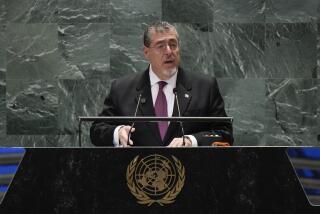Central America’s Crime Wave Spurs Plan for a Regional Force
MEXICO CITY — A proposal by Guatemalan President Oscar Berger to establish a Central American “rapid-reaction force” to fight drug traffickers and gangs is gaining strength, even as opponents say it could become a tool of U.S. interests and threaten the region’s sovereignty.
Several countries in the region are going forward with plans for such a force numbering at least 500 soldiers, sailors and pilots. It would be used to interdict drug shipments in the air and on the land and sea while fighting the growing influence of gangs and organized crime in urban centers and in remote drug-trafficking areas.
But the idea has generated opposition among those who say the force could end up serving the interests of the U.S. Moreover, the idea runs counter to the demilitarizing trend that, with U.S. backing, has been in place since the region’s civil wars concluded in the 1990s.
Central America is still recovering from those conflicts, which left tens of thousands dead or homeless and economies in tatters. Over the last decade, the region has been afflicted by escalating criminal activity. At least two-thirds of Colombian cocaine destined for the United States passes through Central American airstrips and on- and offshore points on the way north, U.S. drug enforcement agents have said.
Also, El Salvador, Guatemala and Honduras are waging an intense war against street gangs -- including the notorious Mara Salvatrucha -- whose members number about 50,000. Their activities often are transnational, involving trafficking in drugs and people. Many are former convicts who have been deported from the United States.
Berger and Honduran President Ricardo Maduro have said that their nations’ armed forces, greatly reduced after the end of armed conflict, are not up to combating organized crime on their own and that a regional approach might be the only answer.
Guatemalan Interior Minister Carlos Vielmann said Monday that the force could become a reality only if the United States agreed to provide training, equipment and intelligence.
“President Berger proposed that every country in the region provide support in the fight against organized crime and that the United States should participate with equipment and personnel,” Vielmann said.
U.S. State Department officials declined to comment Monday on the idea of a rapid-reaction force. Though a diplomatic source said the U.S. had encouraged Central American leaders to form a peacekeeping force for deployment outside the region, as in United Nations missions, it has taken no official stance on forming a military force to confront security threats in the region.
At a June meeting of the region’s presidents in Honduras, Berger floated the idea of such a force as a way to form a common front against rising crime. A motion supporting the idea was approved at the meeting by Berger and the presidents of El Salvador, Honduras and Nicaragua.
Col. Jose Ernesto Lopez, a spokesman for the El Salvadoran armed forces, said the key for such a force would be “the mechanisms for expeditious and integrated communication between Central American nations, something that has taken on much impetus since the meeting of presidents in Honduras.”
However, the four leaders each said the involvement of the United States was crucial.
To ensure its success, “the force will need the will of the Central American countries and the vital support of the United States,” said Leonel Sauceda, spokesman for the Honduran Ministry of Public Security.
The plan’s opponents said they feared that the force would serve Washington’s agenda of fighting terrorism, drug trafficking and illegal immigration because it would depend in large part on U.S. intelligence.
“The problem is that it would be a repressive, not a preventive, force,” said Grisel Grapo of the Center for Guatemalan Studies in Guatemala City. “The other is that Central American countries don’t have their own agenda that establishes what the threats are to their national security. If they did, there would be a better dialogue on adopting an appropriate front.”
Leonel Gomez, a Salvadoran security consultant, said the danger of such a reaction force was that it might become an “out-of-control SWAT team.”
“Who would come up with the intelligence on which the team would act? Would it be Guatemala? Honduras? El Salvador? Without coordination of intelligence, responding in a violent manner and without oversight, it would only engender more violence,” Gomez said.
Other unanswered questions have to do with how the force would be commanded, what its jurisdiction would be and what circumstances would trigger its deployment.
Julia Sweig, a senior fellow at the Council on Foreign Relations, a Washington think tank, said that although any regional military force with U.S. involvement was bound to raise sovereignty issues, Central America should consider some sort of “collective mechanism to deal with these unconventional security threats.”
But she warned that the region’s nations couldn’t rely on the United States to be the “uber-organizer of all that. The United States is stretched too thin.”
*
Times staff writer Kraul reported from Mexico City and special correspondent Renderos from San Salvador.
More to Read
Sign up for Essential California
The most important California stories and recommendations in your inbox every morning.
You may occasionally receive promotional content from the Los Angeles Times.










